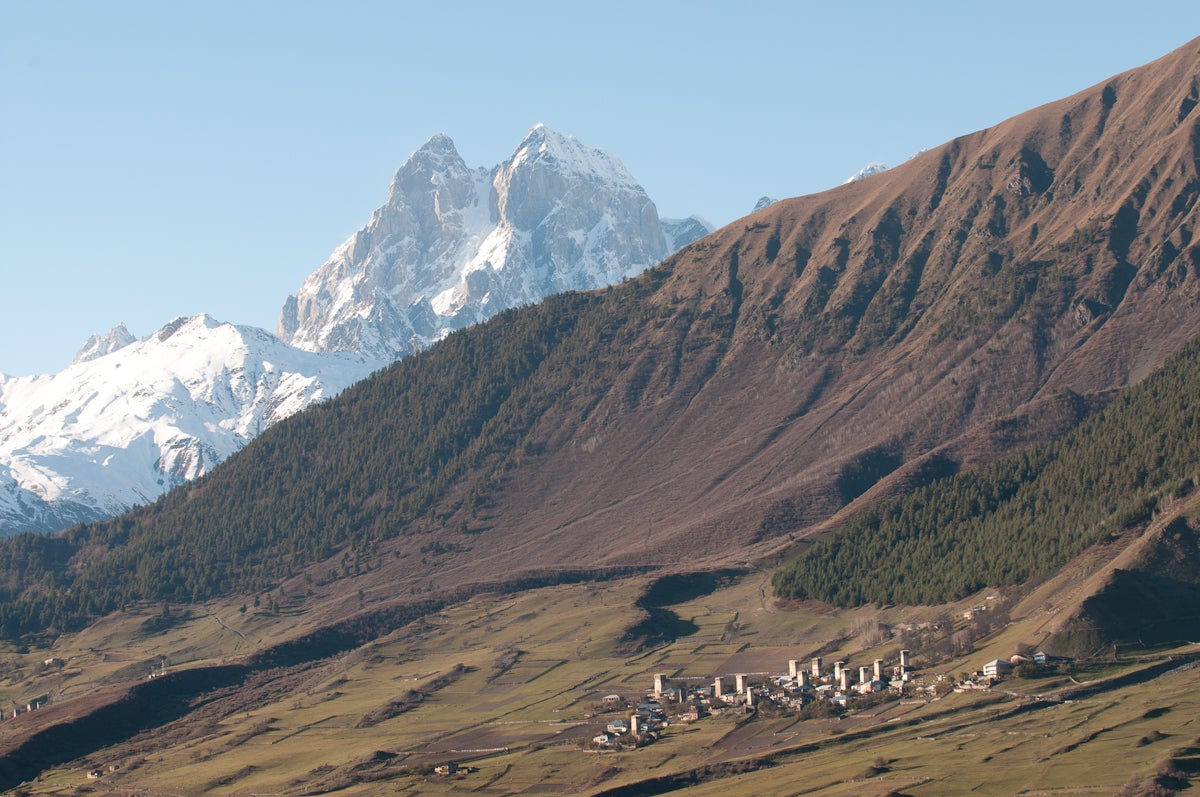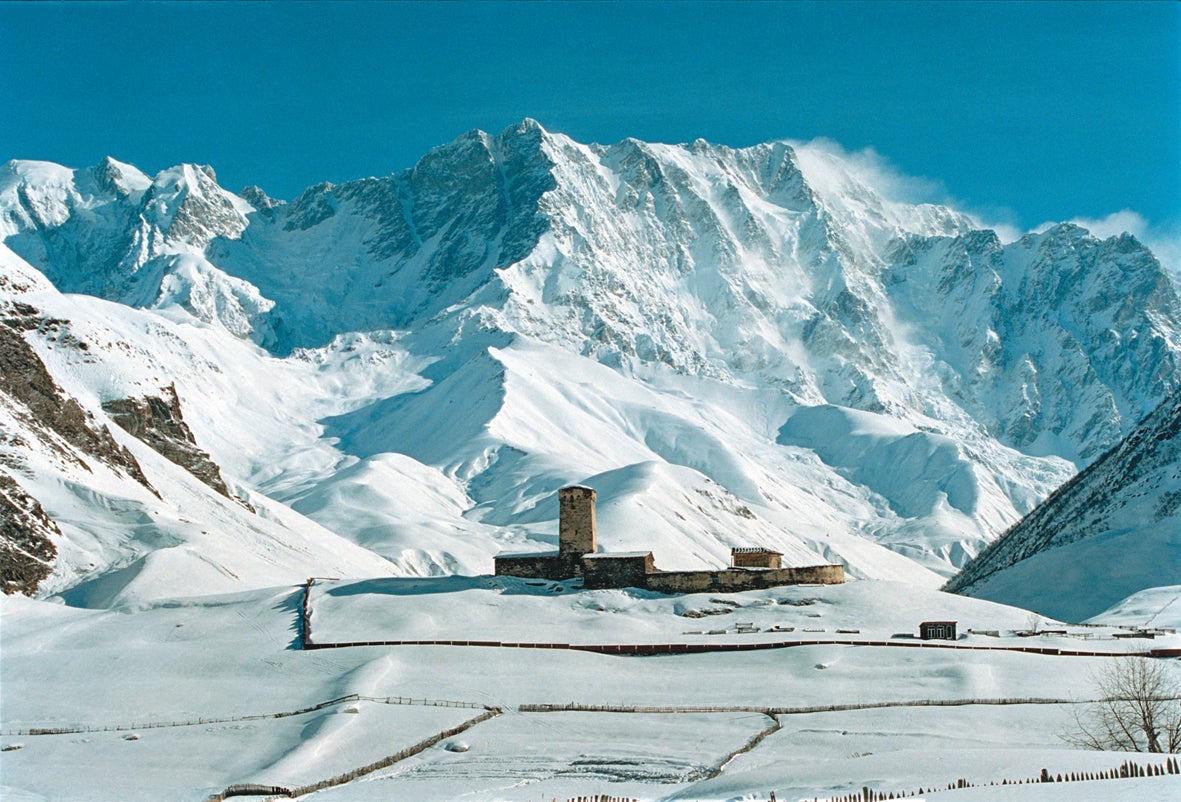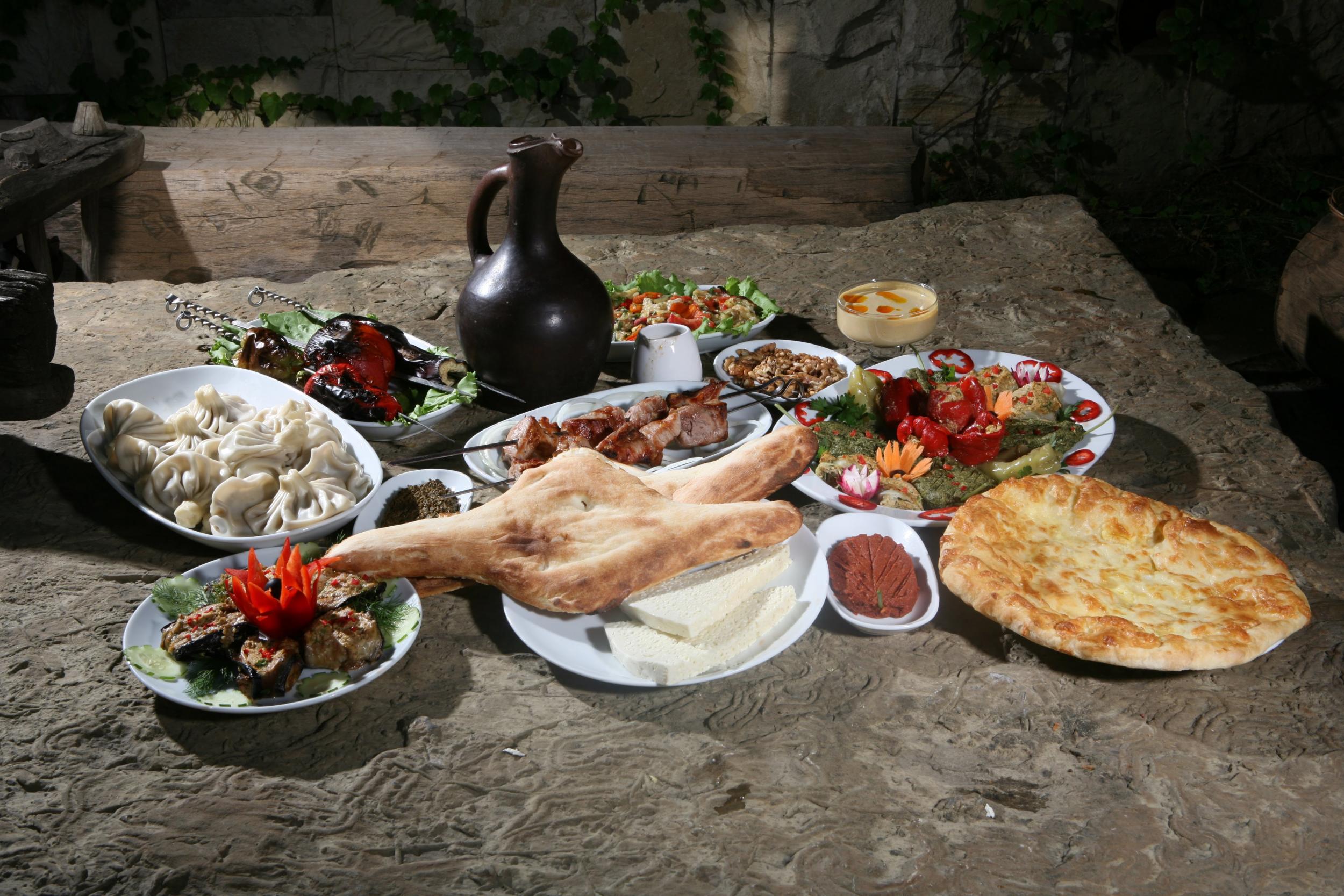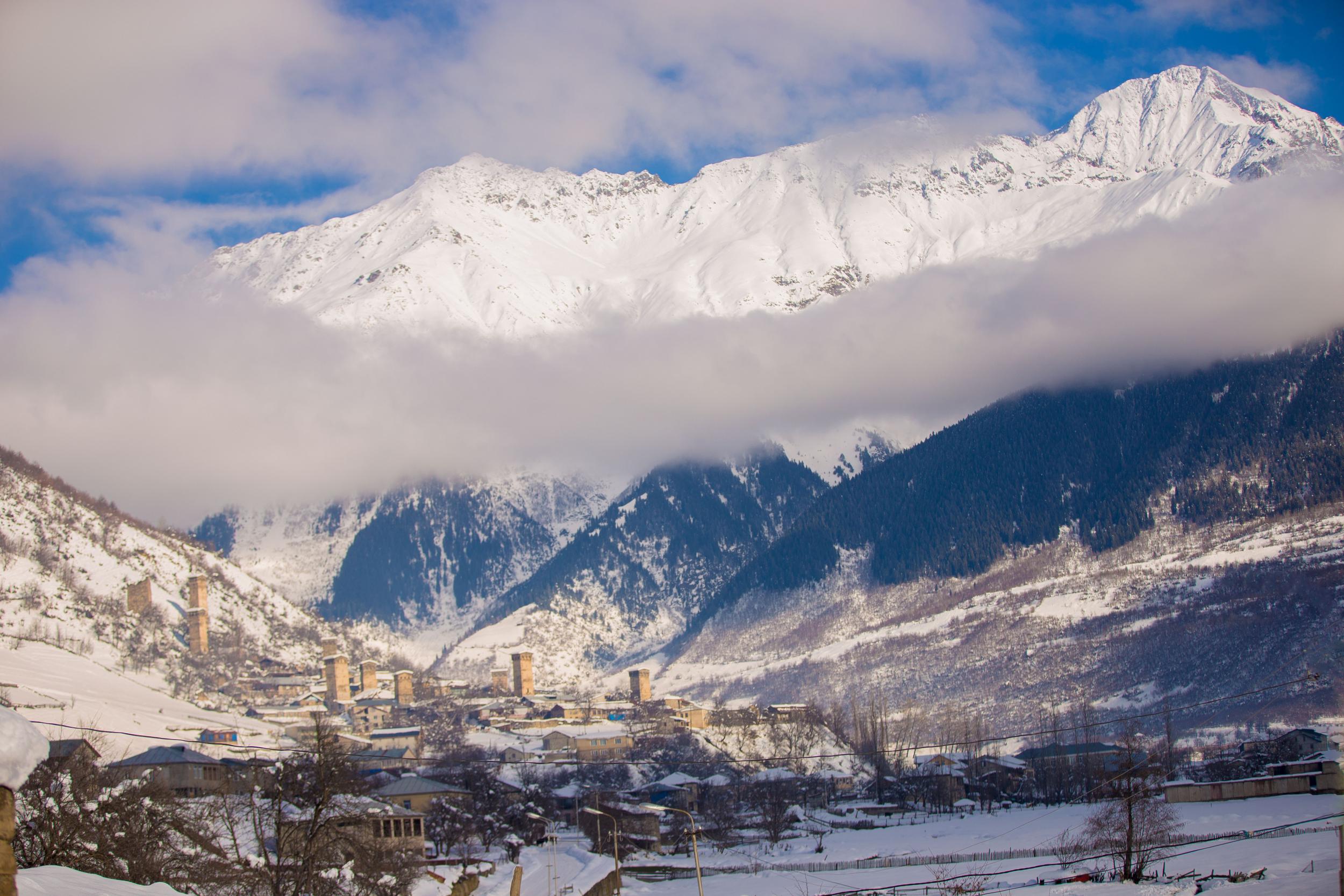Why western Georgia is Europe’s epicentre of self-sustainable living
In the continent’s highest inhabited region, Simon Parker finds potent liquor and the warmest hospitality he’s ever encountered

Of course, you’ve no obligation to drink these,” says my host, Maizer, as he pours our second quadruple shot of homebrewed moonshine and begins raising a toast to new friendships. “But I’m sure you’ll sink at least three.”
Egged on by peer pressure and a desire to not offend, I chug down the glass goblet of golden wheat spirit, before letting out an involuntary, hoarse roar. The inside of my cheeks itch and twitch from the 50 per cent proof liquor – and once washed through my quaking oesophagus, the fiery liquid creates a scorching hotspot in the pit of my stomach. I feel like a kerosene lamp waiting for a wick.
Thankfully, as Maizer begins pouring our third shot, his wife, Mimosa, arrives from the kitchen – somewhere in the now foggy middle distance, grappling a vast tray of food. “Everything we eat here, we’ve grown ourselves,” she tells me, as my inebriated eyes bulge at the prospect of Kubdari (oven-fresh bread stuffed with beef mince, onion, garlic, coriander, chilli and wild dill) – homegrown beef tomatoes swimming in sweet vinegar – and foraged field mushrooms layered with thick slivers of salty Sulguni cheese.
“It’s the reality of mountain living,” she goes on – as I stuff the butter-soaked, steaming bread into my mouth and look out over the Patara Enguri River, snaking through the small village of Khaishi. “We grow a surplus of potatoes and beans, then trade them with our neighbours for anything they might have. It’s a busy time of year for us before the winter snow. It’s important that we’re resourceful now and prepared for the cold.”
Autumn is a time of great abundance in the mountainous regions of northwest Georgia, where self-sustainability isn’t merely a trendy food fad – but the difference between a cosy and well-fed six months or a cold and hungry wait until summer.
There’s quince, grapes, apples, pears and plums to pick, pickle and preserve. Meats and cheeses need to be cured and smoked, and wild herbs like blue fenugreek must be dried and crumbled into a fine powder, before being used to season winter stews and soups.
Rosehips bulge on their branches like clutches of unpolished rubies and the lush petals of amethyst Rhododendrons have just taken their first crispy turn. As my driver, guide and I bump through the Greater Caucasus – cutting into sharp-peaked valleys and narrow slate ravines – the warm scent of chestnut and hazelnut trees mix with the icy mists of glacial meltwater.

On the roadside, giant rusty pylons hold up fizzing electrical wires, above nomadic beekeepers that have set up shop beside their hives. “I travel with 400 swarms between different altitudes throughout the year,” I am told by Beso, now in his 26th year of itinerant bee-husbandry, as my index finger is lathered in thick acacia honey.
“It all depends upon the weather conditions of a specific year,” he continues. “But I’ll usually harvest about two tonnes across three different locations. I’ve just spent the last few months up here in the mountains. But now it’s turning colder and I’m getting ready for the early flowering seasons in the subtropical lowlands near the Black Sea.”
According to the Ministry of Internal Affairs, a record 8.7 million international traveller trips were made to the country in 2018 – contributing 7.6 per cent to GDP. But while 52.3 per cent of visitors concentrated on the capital, Tbilisi, just 4.6 per cent visited the western city of Kutaisi. A new international airport has, however, made this region easier to reach than ever before and Wizz Air now flies in every Thursday and Sunday from London Luton.

To the south of Kutaisi, the well-irrigated lowlands rarely dip below 10 degrees in winter – making it an ideal place to cultivate tangerines, pomegranates, persimmons, walnuts and kiwis. But to the north, where the region of Samegrelo gives way to Svaneti’s precarious single-track mountain roads, temperatures can fall to as low as minus 30.
Harsher still, unrepentant snowdrifts have been known to leave some small mountain settlements cut off for weeks or months on end. But despite the unpredictability of the elements, Svaneti’s hardy residents appear to pride themselves on their ability to hunker down when the weather bites.
“It can be hard, but I love the winter here,” says the surrealist artist Fridon Nijaradze, as we admire his Dali-inspired paintings on the wall of his workshop in the mountain village of Ushguli and sip from glasses of warming raki. “When I was a child I used to walk around with just a piece of white chalk and sketch on old broken planks. You see; I have to paint these scenes – to get them out of my brain. If I don’t, they linger in my dreams.”

At an altitude of 6,900 feet, and with a population of just 250, Ushguli’s mountainous inaccessibility has served as the overwhelming inspiration for Fridon’s artistic oeuvre. His trippy depictions of the village nearly always include its crumbling limestone Koshkis (defensive mediaeval stone towers) topped with a dusting of brilliant white snow. But the climate, he warns, has changed before his very eyes.
“In my lifetime there has been an obvious change up here. There’s considerably less snow in winter and the summers are noticeably warmer. When I was a child I remember how keys would freeze in padlocks. But that doesn’t happen anymore.”
Now in his late 70s, Fridon has lived a quiet life in a quiet village, but as more tourists arrive each year he’s grown steadily concerned for Ushguli’s fragility. “Tourism has positive and negative sides – but I’m worried that the village will lose its traditional aesthetic with more modern guesthouses being built.”
Recognised as a Unesco World Heritage site, Ushguli has the feel of a French Alpine ski resort – complete with suntrap terraces and pine cabins – just with considerably more stray dogs and cappuccinos that don’t require a remortgage. In the past, it served as a hub for intrepid mountaineers and backcountry skiers, but these days it’s also gaining popularity among small coach tours and multi-day hikers trudging between homestays.
Tourism has been a boom industry in Georgia for the past decade or so – and between 2017 and 2019, 257 new hotels opened nationwide. It’s now hoped that by 2025, 11 million foreign tourists will visit each year. And while Tbilisi will continue to attract time-poor city-breakers, western Georgia will surely grow in popularity among adventurous tourists craving the road less travelled.
Svaneti feels excitingly off the beaten track, even by Georgian standards – and over the course of a week, bumping up and over mountain passes, I spend most of the time wondering if I’ve travelled anywhere on the planet that exudes such raw and genuine hospitality. Georgians are renowned for their warmth, but the harsh mountain climate seems to unite people even further – connected by their collective desire to tackle all that Mother Nature can throw at them.
At least a dozen times I am reminded that “visitors are a gift from God” – and while I feel it’s important that travel writers avoid banal platitudes regarding “friendly people”, I can honestly say that of the 100+ countries that I’ve lived and worked in during the past 15 years, I’ve never felt so immediately at home. I suspect that some travellers visit Georgia and never feel the need to leave – and I too could see the attraction of conveniently losing my passport – however, my bulging waistline and pickled liver certainly wouldn’t thank me for it.
“This toast is for all of Svaneti’s mountain people – but also all the cultures of the world that strive to live self-sustainably,” I am told by my final host, Tornike, in the even tinier mountain village of Khalde – as he pours out our fifth beaker of whiskey in what feels like as many minutes.
Dense plumes of steam from our organic cabbage, potato and beetroot soup entwined with his thick cigarette smoke and broke against the knotted overhead beams in the ramshackle basement of his half-built guesthouse.
“This time next year I hope to be sharing my home with people from all over the world…” He goes on, as the first intense snowdrift of winter buffeted the windows and doors. “But in the mountains, we must stick together!”
Travel essentials
Getting there
Wizz Air flies to Kutaisi every Thursday and Sunday from London Luton.
Visiting there
Traffic Travel is a Tbilisi based tour company organising custom-made culture and adventure itineraries in Georgia.
Join our commenting forum
Join thought-provoking conversations, follow other Independent readers and see their replies
Comments